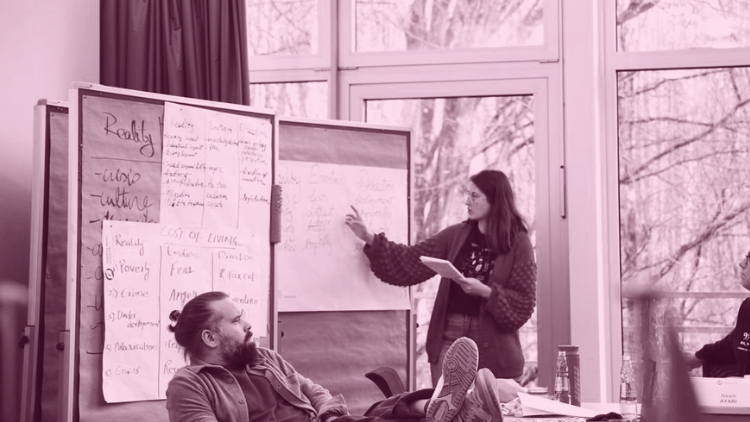Alumni
Building Bridges: The Case for Socializing Liberalism

It has become more and more apparent in the last years that we live in a world polarized by competing ideologies as the global political landscape has witnessed a notable shift marked by the rise of populism in various forms. This shift and its implications has raised countless discussions and theories and indisputably, many concerns. It is in this context that the International Academy for Leadership (IAF) of the Friedrich Naumann Foundation organizes the seminar ¨Liberalism vs. Populism – How can liberals win?¨. The seminar provides a platform for participants from all over the world to engage in nuanced debates with scholars, experts and policymakers in an attempt to make sense of the challenges that this change brings on a global level.
Quite early in the course of the seminar, after some theoretical discussions about the clash of values between liberalism and populism, there was one particular reaction of one of the participants´ that shaped how I was going to approach this experience. He stated something along the lines of ¨it seems that we call populist whatever person that does not agree with us¨ There is a very well-known characteristic of populism that it frames political debates in terms of ¨us versus them¨ dynamics, that there´s always a ¨bad other¨ that some hero representing the people has to fight. Could it be that liberals can be guilty of the same rhetoric? And if so, why do they leave this impression and how do we move on from here? I obviously do not have the answers, but the seminar surely inspired me to think various aspects through.
Liberalism encompasses a broad umbrella of concepts and principles, ranging from classical to egalitarian, from economic to social, and so on. This diversity within liberalism can contribute to people feeling that they cannot easily identify with it, or identify only partially, which can lead not only to confusion, but also to not being able to perceive liberalism as relatable. This is completely opposite from the more straightforward and compelling messages of populism which often relies on emotionally charged rhetoric and simplified narratives that resonate with people´s fears, frustrations, and aspirations. Populist leaders adeptly tap into sentiments of disillusionment with the status quo, promising straightforward solutions to complex societal problems.
And the reality nowadays isn´t necessarily helpful for liberalism either. The persistence of, for example economic inequality, heightens the perceived elitism within liberal circles, which continues to fuel resentment and discontent among segments of the population. Populism tends to offer straightforward solutions to complex problems, often oversimplifying the challenges faced by society. It promises to address grievances and prioritize the interests of ¨common people¨. It´s obviously debatable whether these solutions can be considered feasible, but the point here is that it is not so incomprehensible why this approach can be appealing to individuals who seek clarity and immediate answers. When people feel left behind or marginalized by traditional political structures, they may turn to populist movements that promise quick fixes and radical change.
Thus, one can argue that liberalism´s failure to connect with people stems not only from its perceived elitism, but also from the complexity and diversity of its principles. Populism on the other hand, seems to succeed because it offers a seemingly unified and relatable narrative, even though it is at the expense of nuance and comprehensive policy solutions.
This challenge that liberalism has is quite similar with the one in law and justice systems. Just as the law must be accessible and understandable to all citizens, liberalism must speak a language that resonates with people from all backgrounds. And this does not imply changing or diluting liberalism´s core principles, but translating them into narratives that address people´s concerns. The clash between liberalism and populism is not just about competing ideologies, but also about effective communication and engagement. ¨Socializing¨ liberalism is going beyond traditional political rhetoric, genuinely seeking to understand, address, and adequately communicating everyday challenges. This can bridge the gap between all this diversity of principles and concrete realities.
Whatever the approach moving forward might be, for me, the main takeaway of the seminar is that we cannot fall prey to the same attitudes we highly condemn and oust in populism and dismiss the ¨other¨. Yes, the rise of populism should serve as a wake-up call for liberalism to evolve, adapt, and reclaim its role as a driving force for progress, inclusivity, and democratic values. But not by judging and positioning itself higher on an imaginary scale of morality and righteousness. This would only disconnect it even more from the general public. Irrespective of the massive clash of values between liberalism and populism, the focus should be on building bridges rather than even more barriers. Countering the appeal of populism requires not only articulating a clear and compelling liberal narrative, but also demonstrating a genuine understanding and commitment to address the needs and aspirations of all segments of society.
How can liberals win? I for sure do not have the answer. But maybe reconnecting with grassroots movements, addressing genuine grievances and articulating a compelling vision that combines liberal values with a pragmatic approach to addressing societal concerns is a good way to start.
